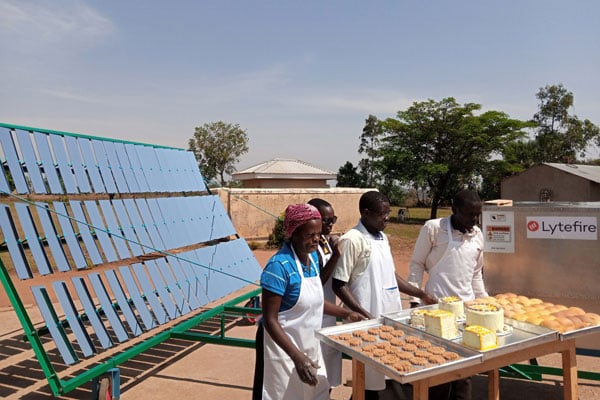Prime
Change to solar power, Museveni tells Defence

(L-R) Hon Vincent Bamulangaki Ssempijja, Minister for Defence and Veteran Affairs, Baroness Sandip Verma, Chairperson, Nexus Green Limited and Rikki Verma, Chief Executive Officer Nexus Green Limited interacting during the prelaunch of 516 KWP solar power plant at Kololo Ceremonial Ground Kampala on February 25, 2022. Photo | Ismail Musa Ladu
What you need to know:
- This was revealed by the Minister of Defence and Veteran Affairs, Mr Vincent Ssempijja, at the pre commissioning of the 516Kw Hybrid solar power plant at the Kololo Ceremonial Grounds in Kampala at the weekend.
President Yoweri Museveni has instructed the Ministry of Defence to see to it that all army barracks in the country transition from the costly hydro generated electricity to a more affordable solar energy.
This was revealed by the Minister of Defence and Veteran Affairs, Mr Vincent Bamulangaki Ssempijja at the pre commissioning of the 516Kw Hybrid Solar Plant power plant at Kololo ceremonial grounds over the weekend.
According to Minister Ssempijja, power bills are straining defence sector budget, justifying what he referred to as “strategic decision” by President Museveni to transition from “the expensive hydro generated power” to more affordable solar energy for all the army/military barracks in the country.
He said: “Ministry of Defence and Veteran Affairs like elsewhere has been running a constrained budget. One of the areas of stress has been utilities, and more specifically the electricity where we have been incurring an astronomic bill of about Shs 19.7 billion annually with a budget deficit of about 63 per cent, therefore reverting to solar is the way for us to go.”
He continued: “Special thanks go to the Board and Executive of M/s Nexus Green for their ingenuity and zeal, to interest us in Solar Power generation as an alternative to clean energy source that will gradually wean us from biting high UMEME power bills.”
In his remarks on Friday, Mr Ssempijja noted that the 1.8million Euros development executed by Nexus Green, British Engineering, Procurement, and Construction (EPC) company, is a realization of the Strategic intent of the President and Commander-in-Chief, whose guidance is: “Reduce expenditure on electricity by looking at the option of running the barracks on Solar Power,”
And this was the “genesis of this innovative and strategic project" being executed by Nexus Green. However, the rollout to other barracks will depends on the performance and results of this pilot projects, according to Mr Ssempijja.
“I am confident that the rollout will be the next step, whereby the excess produced in the few barracks that we shall install Solar production shall be loaded onto the main grid, and go to offset consumption incurred elsewhere.
“I, therefore add my support and voice to implore Ministry of Energy and Mineral Development to put in place the enabling policy framework for what you experts call net-metering,” he said
According to Nexus Green Founder and Chief Executive Officer, Rikki Tarun Verma, this – net metering is the next development under consideration. With this element—net metering, the barracks and in this case the Ministry of Finance will not only get a credit to hedge against the electricity they use from the grid but also be in a position to give excess energy generated back to the grid for other sectors to use.
Speaking at the occasion of the site-visit and pre commissioning of the 516Kw Hybrid Solar Plant, the Managing Director of Nexus Green Limited, Mr Andrew Musoke, said Uganda is an ideal investment destination for such a project and therefore an ideal place to set up their headquarters.
“As 1 of the 13 countries in the world that sit on the equator, the sun is always shining bright making Solar Power an obvious solution to providing affordable and clean energy. Nexus Green is thrilled to be able to support Uganda's green journey and happy to call Uganda Home,” he noted
He continued: “For this project, we are very proud to have partnered with the Ministry of Defense and Veteran Affairs and excited to share that we are very much looking forward to continued work in supporting the people of Uganda as they strive to live in a greener and cleaner world where renewable energy and sustainable solutions are at the forefront of everything we do.”
DON'T MISS: Doing right with your solar panels
BACKGROUND
Solar power
A National Households Survey 2019/2020 conducted by Uganda Bureau of Statistics revealed that the number of Ugandans connected to solar energy rose exponentially in the period ended June 2020.
According to the survey, solar energy connections increased from 18 percent in 2017 to 38 percent compared to a drop in hydro and grid connections during the same period.
The survey indicates that grid connections dropped to 19 percent for the period ended June 2020 from 22 percent in 2017.
The reduction came at a time when Uganda is producing more power than available demand. As of April 2019, generation capacity stood at 1,167 megawatts, with a peak demand of about 625 megawatts, consumed by at least 25 percent of Ugandans.





